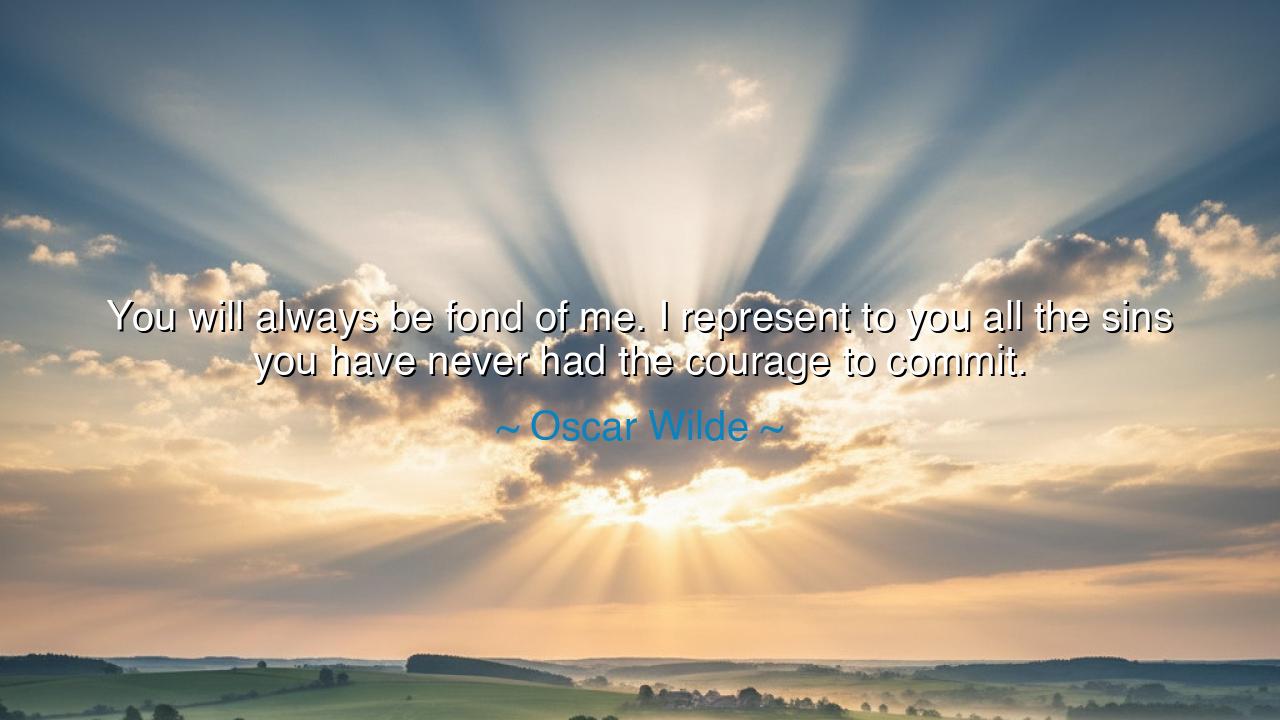
You will always be fond of me. I represent to you all the sins
You will always be fond of me. I represent to you all the sins you have never had the courage to commit.






The brilliant and scandalous Oscar Wilde, master of paradox and prophet of beauty, once wrote the haunting line: “You will always be fond of me. I represent to you all the sins you have never had the courage to commit.” This declaration, spoken by Lord Henry Wotton to Dorian Gray in Wilde’s The Picture of Dorian Gray, is more than the voice of a charming tempter—it is the whisper of temptation itself, the dark reflection of the human soul confronting its hidden desires. In these words, Wilde reveals the eternal struggle between desire and restraint, between the life we live and the one we secretly yearn for.
To understand this quote, one must understand Oscar Wilde himself—a man who lived as both poet and paradox. In Victorian England, a world draped in propriety and moral restraint, Wilde stood as a living contradiction. He celebrated beauty, pleasure, and art above all else, yet beneath his wit and elegance burned a deep awareness of society’s hypocrisy. When he wrote The Picture of Dorian Gray, he poured his own conflict into its pages—the tension between the artist’s yearning for freedom and the world’s demand for virtue. Through Lord Henry, Wilde gave voice to the seductive philosophy of aestheticism, the belief that life should be lived as art, beyond the limits of morality.
In this line, “I represent to you all the sins you have never had the courage to commit,” Lord Henry becomes the embodiment of what every soul fears and desires—the voice that tempts us toward forbidden dreams, toward the shadowed paths we dare not tread. Sin, in Wilde’s usage, does not merely mean moral transgression; it is the defiance of convention, the assertion of individuality against repression. It is every unspoken longing, every impulse we silence for the sake of acceptance. When Lord Henry says this to Dorian, he is not boasting, but revealing the truth of human fascination: we are drawn not to purity, but to the mirror of our own forbidden selves.
History has seen this dance between virtue and temptation play out in the lives of many. Consider Christopher Marlowe, the Elizabethan playwright whose character, Dr. Faustus, sought knowledge and pleasure beyond human limits. Like Dorian Gray, Faustus is lured by the promise of experience without consequence—and, like him, he pays dearly. Yet we, the audience, cannot look away. We admire Faustus even as we pity him, for in his reckless pursuit of truth, we see our own hunger for more. Wilde understood this fascination—the way humanity gazes upon the sinner not with disgust, but with envy. We condemn what we secretly crave.
Thus, Wilde’s quote is not merely about Dorian’s admiration for Lord Henry—it is a reflection on all human nature. We are drawn to those who live boldly, who speak the words we fear to say, who dare the world’s disapproval. They are the living symbols of our unfulfilled desires. The saint respects the sinner because the sinner has the courage to live the dream the saint only imagines. Yet Wilde warns us: such courage, when untempered by wisdom, becomes destruction. Dorian’s downfall is not in feeling temptation, but in surrendering wholly to it, losing himself in the pursuit of pleasure unmoored from conscience.
The lesson, then, is one of balance. The human soul must not live as a prisoner of repression, nor as a slave to indulgence. To deny all desire is to deny life; to obey every impulse is to destroy it. The wise man acknowledges his shadows, learns from them, and transforms their power into creation rather than ruin. Wilde’s brilliance was not in glorifying sin, but in revealing that temptation exists to teach us who we are. The desires we suppress reveal our deepest truths—our hunger for freedom, passion, beauty, and meaning. But only by confronting them consciously can we rise above them, not be consumed by them.
So, my children, take this wisdom as both warning and awakening: do not fear your desires, for they are part of your humanity. But do not worship them, for they can make you forget your soul. Look within yourself and ask—what is it I envy in those who live without restraint? What longing hides beneath my judgment? The one who understands his desires without being ruled by them becomes free.
For as Oscar Wilde knew, the greatest tragedy is not to sin—it is to live without ever daring to truly feel. Yet the greatest triumph is not to indulge every desire, but to turn passion into art, longing into purpose, and temptation into truth. Thus, when you encounter those who live boldly, do not simply admire them—learn from them. Recognize in them the reflection of your own untamed spirit, and then, with courage and wisdom intertwined, live your life as both art and virtue. In doing so, you will fulfill the balance that even Wilde himself sought—the harmony between the beauty of desire and the power of self-mastery.






AAdministratorAdministrator
Welcome, honored guests. Please leave a comment, we will respond soon